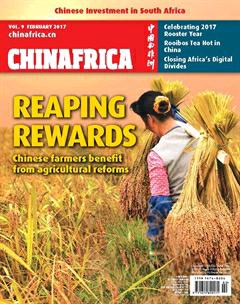Good to Go
By+Xia+Yuanyuan
Unlocked! Please fasten your safety belt! lets go!
Thats the message 32-year-old white collar worker Ma Yizhen heard when he sat down in the two-seat hatchback Benz Smart car. Ma had rented the car through an app called TOGO developed by the namesake Beijing-based tech company, which launched its car sharing service in the city in August 2015. The ease of finding a car close to his work place was a blessing in Beijings concrete jungle.
“It is even more convenient than to own a car by myself. It[TOGO] provides users with easy rent and easy park services through its app,” Ma told ChinAfrica.
Since 2014, the sharing economy has grown rapidly in different industries in China, especially in helping commuters. The services of travel sharing are based on the concept of information spreading and sharing. Using mobile apps on a smart phone, people can easily locate, find out and reserve different kind of transportation option in the nearest place and in the shortest time. Examples are the intelligent “rent-a-bike”service providers Mobike and Ofo, online car-hailing service providers Didi and Uber, and the newly emerged TOGO, which provides a car2go-inspired service. Transportation sharing services provide people, especially young people in large cities, more options to get around and also offer a new lifestyle.
Affordable transport
Ma described car sharing as a fashionable, simple and convenient experience. “My friend shared his TOGO experience with me, which aroused my strong curiosity to try,” he said.“The calculation of rental fees is based on how long the car is used and how far it goes,” Ma told ChinAfrica. To use the service, users have to pay a deposit of 1,500 yuan ($216) before they rent, which will be fully refunded if users dont commit any traffic violations or damage to the vehicle while using the car. In addition to paying $0.27 per km, users will pay a fixed rate of $2.1 for the first 30 minutes they use the car and an additional fee of $0.04 per minute after the 30 minutes.
“It takes me half an hour to drive 10 km from my work place to home. The expense is about 34 yuan ($4.9) which is reasonable. More importantly, I enjoy driving a car by myself. It gives me a sense of freedom,” said Ma, adding that the gas is free and the parking fee is refundable.
As of now, TOGO has more than 100 service areas across Beijing and 300-plus cars composed mostly of Smart Fortwo cars. Kevin Luo of TOGOs Marketing Department said that there would be 1,000 TOGO cars, a three-fold increase, by early 2017 in Beijing. TOGO provides its users with easy location and reservation of their cars through its app. Now, TOGO has amassed more than 30,000 registered users in Beijing. These users are composed of mostly young white-collar workers, like Ma, commuting between their homes and business districts in the city. Travelling by sharing transport tools with apps like Didi and Uber is not only convenient, comfortable and low-cost, but green and environmentally friendly, which is one of the issues many young Chinese are concerned about. “The streets are too crowded with so many cars in Beijing and the air is bad. Sharing vehicles helps reduce traffic congestion and air pollution,”said Ma.
According to the 2015 Big Data Report on China Intelligent Travel released by Didi Chuxing, Chinas largest mobile transportation solution provider and one of the forerunners of Chinas sharing economy, its car-sharing app eliminates at least 1.14 million vehicle trips every year, reducing the countrys carbon emissions by 13.55 million tons, which is equivalent to the ecological compensation provided by 1.13 billion trees.
Sharing economy prospects
The conception of “sharing” is not new for Chinese. In the 2016 Report on the Work of the Government, Premier Li Keqiang said, “We need to move faster to develop new technologies, industries, and forms of business, boost the development of a sharing economy through institutional innovations, create sharing platforms, and develop emerging industry clusters, such as hi-tech and modern service industry clusters, thus creating strong new engines.”
In recent years, the number of enterprises and the amount of venture capital and financing invested in the sharing economic field have exploded. In 2015, the total financing of Didi Chuxing exceeded 22.9 billion yuan ($3.3 billion). “The sharing economy could push the countrys economy by creating demand, increasing productivity and entrepreneurial competence,” said Zhang Xinhong, Director of the Information Research Department of the State Information Center of China.
Besides, a sharing economy provides a large number of employment opportunities, which can effectively reduce employment pressure brought by the economic restructuring. According to data from the 2016 Chinas Sharing Economic Development Report issued by State Information Center and the Internet Society of China, in 2016, the number of people active in Chinas sharing economic sector reached about 50 million, accounting for about 5.5 percent of the countrys total work force.
According to experts, sharing economy should be further promoted. It makes full use of idle resources and offers personalized services at a lower cost to the end user and is more efficient, according to Cheng Wei, Board Chairman and CEO with Didi Chuxing.
Meng Ye, a senior expert at Chinese e-commerce giant Alibaba Groups Ali Research Institute, believes that the sharing economy development will continue to expand from the sharing of unused resources to the sharing of idle resources.
According to the 2016 Chinas Sharing Economic Development Report, in 2015 the market size of Chinas sharing economy reached $282.6 billion. The report predicts that in the next five years, the average annual growth rate of Chinas sharing economy will stand at 40 percent. In 2020, the sharing economy is expected to account for more than 10 percent of Chinas GDP.

